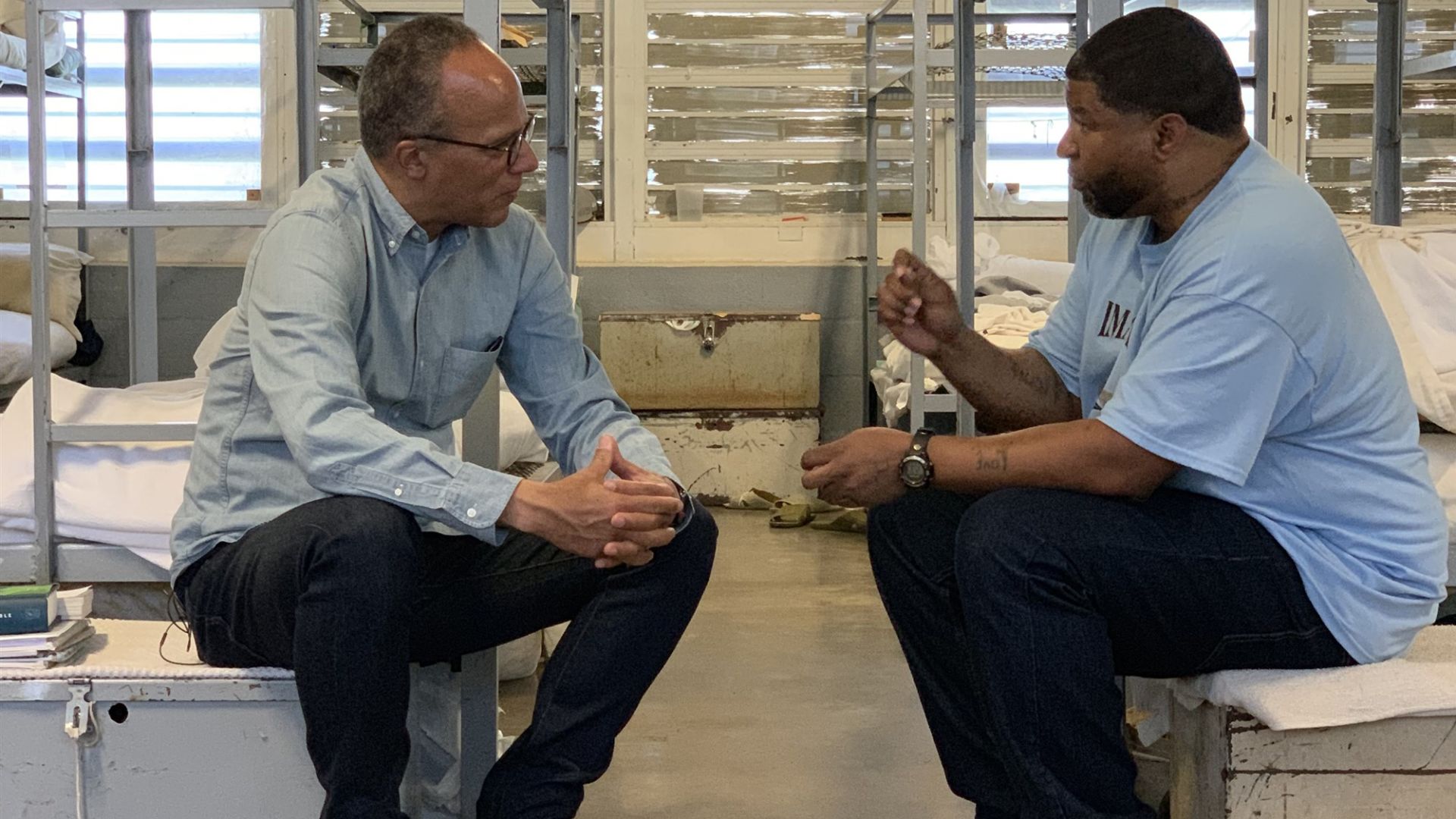
There are moments in life that will never leave us. For Lester Holt, one of those moments came in 1995 as a media witness to a government-sanctioned execution in Crest Hill, Illinois. “I think that was the first time I began to question or really think about the way our criminal justice system works,” Holt reveals to ESSENCE during a recent sit-down interview on the NBC Nightly News set. “Whether it’s meant for punishment or rehabilitation or if it’s retribution.”
Since January, the veteran journalist has made it his mission to elevate the conversation on criminal justice reform and mass incarceration. As the host of Nightly News he’s interviewed the wrongfully convicted, sat down with the formerly incarcerated and held one-on-ones with change agents in the reform space. But this week we see Holt take that conversation one step further.
On Friday, Dateline will air a one-hour special showing the former NABJ journalist of the year, as he navigates the U.S. prison system from the inside.
“We’ve got this huge platform of places to broadcast from; the network, MSNBC, our digital side. So we put this idea together and we said we wanted a centerpiece special — a Dateline hour, and we got the green light,” says Holt of how the “Life Inside” Justice For All project came together.
For two nights, the cameras follow Holt as he experiences the ins-and-outs of what it’s like to be locked up at a maximum-security prison in the country with the highest incarceration rates in the world. He credits his reason for wanting to tell the story from the inside to seeing it primarily from the other side. “It also allows me to use a unique storytelling device in which I’m really taking the viewer on a journey, not only to kind of gawk at prison life, but to focus on some of the critical criminal justice stories from within the prison,” Holt explains.
As of 2016, there is an estimated 2.3 million people being held behind bars throughout the United States. Of those, roughly 6,300 are being held at Louisiana’s Angola penitentiary where Holt visited. Angola is known to some as “The Alcatraz of the South,” but it’s most commonly used name, according to historical records, is that of the former slave plantation it now sits on. Eighty-five percent of the incarcerated men being held behind its towering gates are serving life sentences, most of them are African-American with an average term of nearly 90 years without the possibility of parole.
“We chose Angola in Louisiana because Louisiana used to incarcerate more people than any state in the country. Maybe any place in the world,” Holt affirms. “They came to a realization a few years ago that it wasn’t working. That simply locking more people up wasn’t making them any safer and they knew they had to go a different way.”
Holt believes that Lousianna is in some ways representative of a shift in the country’s mindset around the damaging effects of incarceration and what needs to be done to achieve true justice and equity within the justice system. The evidence can be seen in the growing number of organizations like Cut 50, and the Reform Alliance, campaigns like John Legend’s #FreeAmerica, and the ACLU’s Smart Justice.

“I think it’s a recognition and it’s beginning right now,” Holt says of the escalating interest in the reform space. “A recognition of A. What the intent is — is it to punish or is it to make us safer? I think most people who work in the criminal justice business will tell you it’s about making communities safer but you can’t take the emotion out of it as well.”
During his time in Angola, Holt was introduced to a number of inmates whose stories were both eye-opening and enlightening. One account, in particular, hit a nerve with the seasoned storyteller. “What struck me about him was he’s been in a cell now for four years. He’s allowed out once a day, for one hour where he can walk within the tier. But he’s had opportunities to go outside and hasn’t gone outside for four years,” he recalls. “It really helped me wrap my arms around what this does psychologically and emotionally to people that are incarcerated.”
Though Holt admits that the majority of the men he met during his time on the former plantation were violent offenders who have admitted their guilt, he points to the number of men and women imprisoned for non-violent crimes as well as the lasting effects of the war on drugs as prime examples of where the country’s position on law and order has room for scrutiny. “We’re still seeing the effects of the tough on crime, lock them up and throw away the key 90s as I call them.”
As the mass incarceration conversation continues to grow, it is his hope that both red and blue states, Democrats and Republicans, come together to work out what can be done differently. The road to a multi-million prison population was not paved overnight, but the journey to course correction is one he thinks the entire country should be on. “There’s a deep, long legacy here that has to be confronted as to how we got here,” Holt says. Whether it’s through interviews, town-halls, or two-nights in federal prison, he’s committed to facilitating that much-needed reckoning.
Tune in to Dateline tonight, September 6, at 10 p.m. ET for Holt’s special inside America’s Largest Maximum Security Prison. On Sunday at 8 p.m. ET, catch him, John Legend, Bryan Stevenson and more for an MSNBC televised town-hall on the impact of incarceration at Sing-Sing prison.